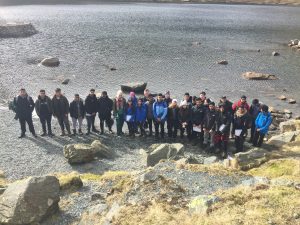Geography Fieldtrip
On 12th March 2018 a group of year 12 and 13 geography students visited the Lake District, Cumbria to conduct our investigative fieldwork. The trip was a 3 night stay in which the group explored different aspects of geography; both physical and human.
Fieldwork is a fundamental element in the tradition of Geographical research and teaching. The fieldtrip to the Lake District aimed to provide us with skills of data collection, using appropriate techniques, in a safe manner, while thinking about the sensitivity to the impact of their investigations on the environment and stakeholders.
On the 12th of March we set out for the county of Lancashire, with the Lake District insight. We left at approximately 8am and endured a 5 hour journey at the expense of Mr Bird’s musical taste! Upon our arrival we were shown around the accommodation and were then quickly on our way to the coastal area of Morecombe to carry out a preliminary investigation about how an area changes over time due to several geographical concepts.
On the 13th of March we were given the opportunity to trek up the Coniston Hills, famous for its copper mines. While up there we studied the previously glaciated landscape, whereby we were able to depict the course of the glacier 18,000 years ago. After a tiresome but enjoyable walk, our eyes were gifted with a beautifully sculpted corrie lake. This was where we were able to relax and have lunch for half an hour, whilst taking advantage of the clean fresh air and scenery.
On the 14th of March we were split into groups whereby we chose to either conduct our field study based on the Human Geography or Physical Geography. Students like Kyron and myself chose to visit the coastal, seaside town of Morecombe, in which we studied the area using different index models to draw conclusions about the levels of decline in the area. On the other hand the physical group took a trip back up to Coniston Hill to conduct fieldwork to help show the course and direction of the former glaciated area.
Overall, I can easily say that the trip was highly enjoyable as well as informative. We gained an insight into the rural lifestyle in which Miss Wharton has sadly left us for! It was quite refreshing and inspiring landscape for us too! The centre which hosted us demonstrated great hospitality skills, which we were very thankful of. Surprisingly the food was quite nice and made the overall experience better. Our highlight of the trip was thrashing another school 4-1 in a game of football, (they had 3 Manchester city youth academy players) this was a great achievement for us. As a whole this trip has brought the class closer together. Our thanks go to Ms Wharton and Mr Bird for organising the trip.
Justin Fletcher & Kyron Chander










